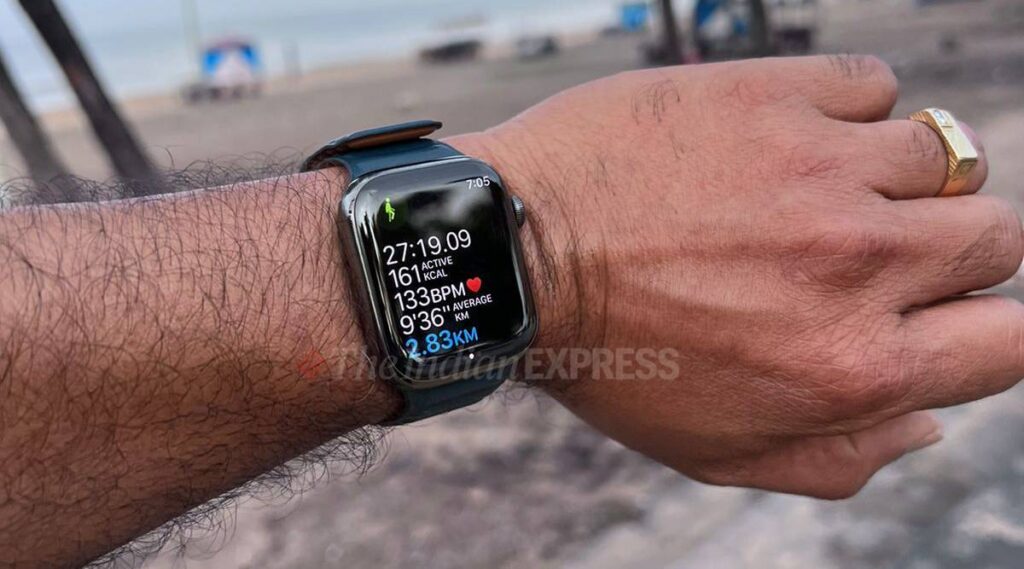The ECG app can record your heartbeat and rhythm using the electrical heart sensor on Apple Watch Series 4, Series 5, Series 6, or Series 7 and then check the recording for atrial fibrillation (AFib), a form of irregular rhythm.
nce again, Apple Watch has been credited for saving a man’s life from a potential cardiac arrest. Nitesh Chopra, 34, a resident of Haryana recently narrated his personal experience, and the details of his story are absolutely stunning.
On March 12, Chopra felt discomfort in his chest and monitored his ECG through Apple Watch which showed an irregular heart rhythm (Afib) alert. He and his wife Neha immediately rushed to the nearest hospital, where they showed the doctor the ECG report from his Apple Watch.
Taking the note of the watch’s results, the doctor performed an ECG. The tests confirmed the watch’s results. On the same evening doctors took charge and performed an emergency angiography as well—which revealed that Chopra’s main coronary artery was completely blocked, this could lead to a potential cardiac arrest.
Immediately, the 34-year old was operated, which saved his life. “We ignored the readings thinking a young man in his early 30s can’t have such arrhythmia. But our last reading on Saturday, March 12, was consistent with the previous alerts and made us believe that something was not right with my heart health and we should rush to the hospital,” Nitesh said, narrating his ordeal.
The couple is very thankful to Apple for saving the man’s life. In a letter to Tim Cook, the CEO of Apple, Neha wrote, “we reached the hospital only because of the technology provided by you and my husband is now fine and healthy. I wish you lots of love and happiness and thankyou for giving my husband his life.“
Responding to Neha’s letter, Tim said, “I’m so glad you sought medical attention and received the treatment you needed. Thanks for sharing your story with us. Be well. Best, Tim”
How to use the ECG app on Apple Watch
The ECG app can record your heartbeat and rhythm using the electrical heart sensor on Apple Watch Series 4, Series 5, Series 6, or Series 7 and then check the recording for atrial fibrillation (AFib), a form of irregular rhythm.
The ECG app records an electrocardiogram which represents the electrical pulses that make your heart beat. The ECG app checks these pulses to get your heart rate and see if the upper and lower chambers of your heart are in rhythm. If they’re out of rhythm, that could be AFib.
Install and set up the ECG app
The ECG app is installed during the ECG app setup in the Health app. Follow these steps to set up the ECG app:
#Open the Health app on your iPhone.
#Follow the onscreen steps. If you don’t see a prompt to set up, tap the Browse tab, then tap Heart.
#Go to ECG and then click Set Up ECG App.
#After you complete set up, open the ECG app to take an ECG. If you still don’t see the app on your Apple Watch, open the Watch App on your iPhone and tap Heart.
#In the ECG section, tap Install to install the ECG app.
Take an ECG
You can take an ECG at any time, when you’re feeling symptoms such as a rapid or skipped heartbeat, when you have other general concerns about your heart health, or when you receive an irregular rhythm notification. Make sure that your Apple Watch is snug and on the wrist that you selected in the Apple Watch app.
#To check, open the Apple Watch app, tap the My Watch tab, then go to General and then click on Watch Orientation.
#Open the ECG app on your Apple Watch.
#Rest your arms on a table or in your lap
#With the hand opposite your watch, hold your finger on the Digital Crown. You don’t need to press the Digital Crown during the session.
#Wait. The recording takes 30 seconds. At the end of the recording, you will receive a classification, then you can tap Add Symptoms and choose your symptoms.
#Tap Save to note any symptoms, then tap Done.
What to do when you receive an alert
If you receive a notification, the irregular rhythm notification feature on your Apple Watch identified an irregular rhythm suggestive of AFib and confirmed it with multiple readings. If you have not been diagnosed with AFib by a physician, you should talk to your doctor. View and share your Health information.
The ECG waveform, its associated classifications, and any noted symptoms will be saved in the Health app on your iPhone. You can also share a PDF with your doctor.
#Open the Health app.
#Tap the Browse tab, then tap Heart and go to Electrocardiograms (ECG).
#Tap the chart for your ECG result.
#Tap Export a PDF for Your Doctor.
#Tap the Share button to print or share the PDF.

Source: indianexpress.com

